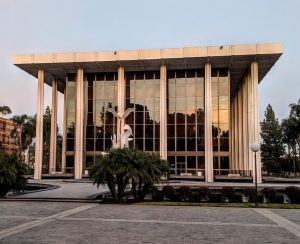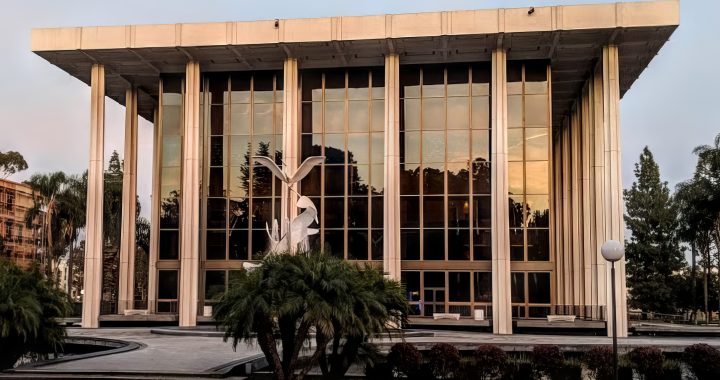The Genesis of the United Church of God
A Personal View from Ground Zero
What happened to a once-thriving church with more than 150,000 members nearly 30 years ago? As this narrative history continues, I plan to share more details of my personal experiences about the unraveling process of the once-vibrant Worldwide Church of God. As we advance toward what led to the rise of the United Church of God, I will occasionally provide back stories of the deliberate dismantling of long-established teachings and policies of the prior fellowship. These will offer important context looking back some nearly three decades ago and the relevance for today.
Here I provide a postscript detailing what followed my resignation on March 3, 1995. What were some of our reactions and feelings that followed in the immediate days and weeks? What did Bev, I and others experience?
What would we do?
After leaving Mr. Tkach’s office on the fourth floor of the Hall of Administration, Bev and I walked up the hill to our apartment on the beautiful former campus of Ambassador College (the church’s college operations and students moved to East Texas in 1990). Our apartment was part of the former 360 Grove Street dormitory.
We had to make some swift decisions about what to do next. This of course included the fact that we needed to move out from the Church apartment that had previously been graciously provided for us. There was a surreal feeling as a new reality gripped us of what we had to do next.
As we neared our residence, we unexpectedly met Randal Dick. He was my counterpart in Church Administration, assisting Joe Tkach Jr. in overseeing international areas of the Church. We spoke often because our two Church Administration divisions had much in common with management and personnel. We had a good working relationship. Bev and I attended the annual European conferences, usually held in France or Austria each spring and Randal participated in domestic activities and events.
A few months earlier, Randal and I traveled together to Uruguay in South America to jointly explore how the Church could fulfill its expanding pastoral needs through training local men as pastors and move away from the costly practice of sending expatriate families from the United States. Our mission was extraordinarily positive as we explored how growing congregations in South America could develop through local talent. While in Salto, Uruguay, we held a combined service with an independent Church of God group on the Sabbath. Randal, Mike Medina, pastor of Uruguay, and I gave messages in English, Spanish, and Ukrainian. The congregation had many Ukrainian immigrants who settled over a few generations. Exciting things were afoot in the then-forward movement of the church.
But now as I met Randal, I immediately told him about my resignation earlier in the morning. His initial response was regret. But he quickly added: “Please don’t start something new.”
Here’s some background, which I disclose respectfully: for some time, Randal and I had been discussing our common concerns about the mounting controversial doctrinal tensions and how they were affecting ministers and members. We both privately decried what we both saw as the callousness of the few who held an iron grip on the church worldwide.
The infamous Manuscript Review Team
Randal and I both served on the Manuscript Review Team (MRT), which reviewed key doctrinal and stylistic messaging in our literature. The team was tasked initially with updating and improving our published media content, primarily in style. But, as the meetings progressed, a gathering storm was building as the changes expanded well beyond mere style. The proposed changes now cut deeply into our practice and belief that identified what we believed, such as the nature of God, the Sabbath, and the entire Law of God.
At first, Randal, along with other ministers on the review team, bravely stood up for our established beliefs. In one instance, I remember how strongly he defended the Sabbath and how he recounted how, for years, his children would not participate in school sports and activities on the Sabbath. Now, that lifelong commitment and practice was being summarily overturned. His passion was dismissed. This MRT process was not collaborative at all. It was shamelessly controlled and manipulated.
But, on this date we had come to a flash decision point. I left. Randal went on to stay.
No prior intent to start a new organization
“Starting something new” never was on my mind. The choice that Bev and I made was a personal one to reflect, defend, and uphold our understanding of revealed biblical truth. It was not one to deliberately lay a foundation for a new organization. Those who know me understand that I’m not a person who indulges in politics or the inordinate wielding of power to erect something for the purpose of opposition for personal gain. Throughout my more than half century of service as a minister, I have always enjoyed working on projects in a respectful team environment, seeking positive and healthy outcomes. What was happening in March 1995 was not one of those.
I’m very much about people and relationships. At that time of crisis, I thought about the 150,000 members of the Worldwide Church of God, our Vision and Mission, and what we would be passing on to our children. Working on the Manuscript Review and Doctrinal Committees, I felt a responsibility for the environment in which either excellent good or great damage to the Church would result. Unfortunately, the unfolding events led to catastrophic results that smashed the heart of a people and a potential future generation. I pleaded with one of the ideologues, warning that if we stay on this path of deconstruction, we will lose half the church. The response was a shrug and a comment: “So be it.” They honestly did not care and were tragically clueless about what was about to happen to their brethren and the Church. By the way, I was wrong about half the people leaving. It was more like 80 to 90 percent who left and fractured into a bewildered shipwreck of confused, betrayed, and even desperate people trying to grab a lifeboat or floating log in this heaving sea and salvage their internalized beliefs. Tragically, I personally grieve over the fact that the annihilation of the Worldwide Church of God also annihilated the once-firm faith of many, leading more than a few to become agnostic. That is indeed a sobering consideration, for in Luke 17:1-3 Jesus Himself solemnly warns “It is impossible that no offenses should come, but woe to him through whom they do come!”
Post Mortem
In the hours after resigning, I felt relief, not unlike the feeling when someone dies after a lengthy disease, where there is temporary solace. But, it doesn’t take long for the sting of grief and loss to roar back.
Here I relate the following events respectfully, simply relating what I experienced at the point of Ground Zero.
That evening following the resignation events of the morning, Bev and I were invited to a friend’s home in Pasadena. There we talked optimistically and positively even though we wished that things would have turned out differently. We detailed our faith and looked to God, Who called us and to Whom we committed our lives, to now guide our next steps. We had no idea what we would do and what might follow.
The next day was the Sabbath, and we walked down the hill from our apartment to Ambassador Auditorium and attended Church services as was our custom. People began asking us about my resignation and came up to express their sadness more than anything else. Today the sermon was delivered by Bernie Schnippert, an eloquent speaker with bright thoughts. But, today, his smoothly-delivered words grated on me. Somber resolve was setting in on my mind.
That particular weekend, Joe Jr. and the Church Administration team were heading for Portland, Oregon, for a regional conference. I had been scheduled to take part, but now all that was history to me. Ministers and wives at the conference learned of my resignation. But Joe and company assured them that “we are working with Vic.”
When Joe returned from Oregon, he called me and asked me to come and talk to him. From personal experience, I knew what THAT meant!
Here’s what this meeting would likely portend: Joe Tkach Jr. and Mike Feazell (Joe Tkach Sr’s assistant), as the chief architects of the doctrinal revolution, often called ministers who became too vocal in defending their lifelong beliefs and who were becoming a menace to the drastic changes that were now out of the closet. Joe Jr. and Mike would talk in tandem with the interrogated party. I was well aware that at times, the session would go on for hours. In this two-on-one “talk,” the interrogated was at a significant disadvantage, knowing that the two held significant autocratic power over them, their life and their vocation. In this phase of the “changes,” a previously expressed “pseudo tolerance” was now giving way to brute force.
Without deliberately eavesdropping, I sometimes overheard some of these heated discussions. My office was right next to Joe Jr’s, and as the temperature of the exchange grew hot, I could not help but hear bits and pieces of the conversations. There was no give, concession, or even hope offered by the two. It was disruptive to me personally. What was once an environment of love and truth and standing up for our beliefs, now became a dark dystopia of despair with people left wondering “how in the world did we get here!?”
In the tag team “talk,” what would be recounted against the minister in question would be the behavioral mistakes of people in the past, logical conundrums, historical contradictions, theological jargon, all mixed together with some smoke and mirrors. During this show, some of our core beliefs that we accepted at the time of our commitment to Jesus Christ at baptism would be finessed away. Some succumbed to this. Others would turn to clear scriptural support to support everything from the biblical understanding, including which day was the Sabbath to the critical Nature of God. It got ugly, particularly with the spreading chatter among the ministry. Core ministerial leadership was fracturing.
Those who chose to stay in the Worldwide Church of God had various reasons for doing so, reflecting a broad spectrum. Some expressed anxiety about an abrupt end of their ministerial career. Others said that God had called them into this organization, and this is where they will stay for better or worse. They would go down with the ship if the worst should happen.
Surprisingly, a number of ministers made immediate 180-degree turns. One, after hearing a sermon abolishing the food laws of Leviticus 11, would deliberately order and consume a pepperoni (pork) pizza that evening. Quick studies? No problem. But not very deep, compared to the many years of biblical study. Other people who stayed back felt that God had a purpose for them to stay even though they deplored and disagreed with the new teachings. A new “cognitive dissonance” was tolerated. As subsequent external research later showed, some people stayed simply because they wanted to maintain friendships and family relationships.
Still others whose livelihood was at the whim and discretion of Worldwide Church of God leadership became hostages. In mid-March it was interesting to see how people drew their personal lines.
I saw many who I believed were afflicted with the “Stockholm syndrome,” a condition which describes the psychological condition of a victim who subsequently identifies with and empathizes with their captor or abuser and captor’s goals. It is also called “trauma bonding” as an emotional response to an unhealthy workplace dynamic. That may be viewed as a harsh statement, but I am certainly not alone in seeing it or concluding same.
An offer was extended to me to go to a tropical location and reconsider my decision to resign. This was personally repulsive. Going to an isolated tropical paradise would not relieve or fix the doctrinal and emotional hell that I was living through. I would not be Faust.
What was that “hell” like? Consider that a few weeks before my resignation, after one of those “tag-team sessions” where the pastor would not recant his beliefs, Joe Jr. asked me to terminate one minister, essentially serving as Joe Jr.’s proxy. But, after seeing others quit or be fired for their beliefs, I decided not to be part of this ministerial death squad. I was particularly outraged at the summary firing of my friend Bill Jahns, then-pastor of the Salt Lake City congregation. He had been one of the victims of the “tag-team talk.” Bill had evidently openly and heatedly objected to the abuse of doctrinal power, giving his boss an opening to fire him for alleged insubordination. As we walked down a hallway, Joe Jr. told me about firing Bill in a detached matter-of-fact way. I silently seethed as he brushed off the sacking with a shallow comment: “I’m sure Bill will survive and do well in another job.”
So, when the invitation to “talk” came from Joe, I declined. I wasn’t going to subject myself to what I knew would be coming.
Then Joe proceeded to ask the question of questions. He cut to the chase: “Vic, do you support the new teachings of the Church?”
Incredulous, I replied, “I can’t believe you’re asking this! Of course not!”
Joe's response was then telling me that I was now removed from the ministry.
That was my last contact with Joe Jr. We have never spoken to one another since.
We then called Doug Horchak in Denver to tell him the news. As I mentioned in prior chapters, he had been with me when I resigned. His wife Tanya (who is Joe’s sister) answered the phone. I told her what happened. She laughed and related that her husband Doug had gotten the same quiz from Joe earlier that day, and that he flunked too! In this inquisition there was no favoritism to family or friends!
Tanya proved to be a source of encouragement over the next few weeks. She would cheer me up by playing a musical riff from a recently released album by the Eagles called When Hell Freezes Over titled “Get Over It.” She would occasionally call me in the mornings and tell me it was time for my song. It was dark humor, but those were dark times.
The Well
Here I would like to respectfully relate another incident. A few days later Richard Rice and his wife Virginia invited Bev and me to come to their home for dinner and for a Bible Study. Mr. Rice was a respected and responsible minister as well as the manager of the massive mail processing department of the Worldwide Church of God. He was previously our neighbor when we lived in the hilly neighborhood above the Rose Bowl stadium in Pasadena. We always maintained a cordial relationship. When some of tremors of the changes started shaking doctrinal ground we would discuss its effect on the Church he seemed sympathetic to the alien assault on Church doctrine.
But now he wanted to tell me something important. As dinner progressed, he started telling me how he was coming around to embracing the new understanding. He told me how it was not easy to believe this, but he told me what he did and how I might follow.
While I deeply respected Mr. Rice, who had once been ordained an evangelist, the subsequent discussion grew unusual, even peculiar. Mr. Rice said it’s not always easy to see Jesus. He indicated that I had not understood who Jesus was and that I needed to find Him. He then told Bev and me that we I needed to look into a deep dark well. Keep looking, keep staring, he said. If we did this, “You will then begin to see Jesus appear.”
We felt very awkward upon hearing this. Mr. Rice was a person of reason and decency. And now this? It was frightening to hear people that we had respected over the years start talking in such a manner.
What had unraveled first were cracks, tremors, leaks combined with an invasion of strange thought. But now emerged a binary decision: remain or exit.

